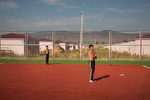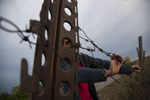PROJECTS: Shifting Borders: Shifting Borders
(on those living near the occupied borderlines of two breakaway regions of Georgia).
What does it feel like when you are living on the edge… to be perpetually on the edge of losing, say, a part of your house? Or waking up to find that your house is divided with
your living room in your own country, but your kitchen now residing within enemy-occupied territory?
Inhabitants of villages in South Ossetia must prepare for this reality, and more of them are having such experiences as time passes. After a brief war in 2008, Georgia lost another portion of its territory to Russian occupation, expanding South Ossetia as a de facto ‘breakaway’ region. This volatile situation has been percolating ever since, for more than ten years. (A similar dynamic occurred in the early 1990’s between Georgia’s Abkhazia region and Russian ‘peacekeeping’ troops.) Since those conflicts occurred, occupying Russian forces continue to play psychological games with nearby residents, including the phenomenon of ‘creeping borders’ which change without notice with little to no attention — much less pushback — from the international community.
Astounded that my country’s territorial limits could be so overtly tampered with on such a regular basis, I started to photograph various villages that border the occupied territories.
My photographs are of the people who are most directly affected: the residents themselves. I photographed their homes, their villages, their surroundings—places where they experienced key events in their lives as part of a post-conflict reality. Here are a few vignettes from the lives of these victims of ‘border creep’, or ‘border flow’. I hope to bring a small relief to them, these ordinary citizens whose voices have been silenced by happenstance, and to raise awareness about the illegal actions at the administrative boundary lines.












































